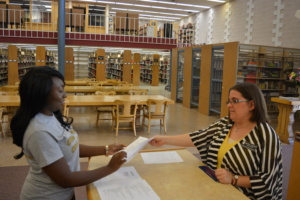By NORTHWESTERN NEWS

We are now two and a half weeks into this semester and already the library has been forced to take evasive action to help eliminate an epidemic of jammed printers, wasted paper and personal printing by impatient students.
According to Susan Jeffries, library services director at Northwestern, the library was forced to relocate its printers to behind the front desk, after the jamming, waste and personal printing issues arose.
Starting with the jamming and technical issues, Jeffries said, “because these printers are used by twenty workstations and because they are capable of duplexing (printing both sides), jamming is a constant problem.”
She said the students would constantly start digging through the printing jobs as they were coming out of the printer, and it would interrupt the flow of the printing job.
Jeffries added students don’t understand that unlike personal printers that are hooked up directly to a computer, the two printers in the library actually run off a network connection. That means it takes just a little longer for a printing job to process depending on the size of document.
“Multiple jobs waiting to print and students impatient to get theirs is just not a good combination,” Jeffries said.
Next, with the excessive amount of waste, Jeffries said last year, students printed over 600,000 jobs were printed in the library, and the majority of those pages went unclaimed by its owner.
Each day in the Alva library alone, Jeffries said, there would be hundreds of pages that were either duplicates or abandoned by impatient students.
Jeffries said the library has tried several different measures to help eliminate the waste before, displaying signs showing how to print multiple slides per page, bringing the issue up in CORE meetings and asking the students to refrain from hitting the print button a second time, but none of them were effective in reducing the waste.
In fact, the only real action that has worked in reducing the amount of waste has been the relocating of the printers to behind the front desk, according to Jeffries.
Lastly, the issue with personal printing by students is simply, it’s too excessive and shouldn’t exist.
“The printing you do on campus is provided so you can print items you need for your classes and assignment,” Jeffries said.
Unfortunately, students take advantage of that by printing pictures of shoes they want, recipes, something for their own children or something for church or even a family reunion, Jeffries said.
By moving the printers to behind the front desk, not only has the amount of wasted paper gone down, but Jeffries said the amount of jamming in printers has been all but eliminated.
If these issues continue to arise however, despite the printers now being relocated to behind the desk, Jeffries said administration, IT and herself has tossed around the idea of having a predetermined amount of pages for each student to have and print off of throughout the semester.
“If students can reduce it [the issues] voluntarily, then there would be no need for that option,” Jeffries said.
